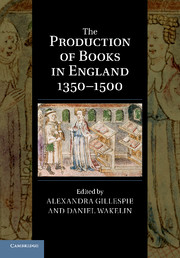Book contents
- Frontmatter
- Contents
- List of illustrations
- List of contributors
- Foreword
- Acknowledgements
- List of abbreviations
- Introduction
- 1 Materials
- 2 Writing the words
- 3 Mapping the words
- 4 Designing the page
- 5 Decorating and illustrating the page
- 6 Compiling the book
- 7 Bookbinding
- 8 Commercial organization and economic innovation
- 9 Vernacular literary manuscripts and their scribes
- 10 Book production outside commercial contexts
- 11 Censorship
- 12 Books beyond England
- 13 English books and the continent
- Afterword: the book in culture
- Bibliography
- Index of manuscripts
- General index
8 - Commercial organization and economic innovation
Published online by Cambridge University Press: 05 May 2014
- Frontmatter
- Contents
- List of illustrations
- List of contributors
- Foreword
- Acknowledgements
- List of abbreviations
- Introduction
- 1 Materials
- 2 Writing the words
- 3 Mapping the words
- 4 Designing the page
- 5 Decorating and illustrating the page
- 6 Compiling the book
- 7 Bookbinding
- 8 Commercial organization and economic innovation
- 9 Vernacular literary manuscripts and their scribes
- 10 Book production outside commercial contexts
- 11 Censorship
- 12 Books beyond England
- 13 English books and the continent
- Afterword: the book in culture
- Bibliography
- Index of manuscripts
- General index
Summary
Bread, meat and manuscripts: to Brunetto Latini these were all the same. They were the fruits of daily trades that involved hand and foot as opposed to mouth and tongue, and these ‘mechanical arts’, as the Italian author argued, after Aristotle, were bound together in that they were all ‘necessary for the life of men’. Latini expressed these views in his The Book of the Treasure (Li Livres dou Tresor), and a miniature in an early manuscript (see Figure 8.1) illustrates the kind of mechanical trades he is referring to, including copying books (‘escriture’). Thirteenth-century Aristotle commentaries echo the view that the mechanical arts, including those of scribes, are a vital necessity for civic culture, ‘[q]uia sine artibus mechanicis impossibile est hominem vivere ad votum [because without [them] it is impossible for men to live as they will]’, as Albertus Magnus put it in his commentary on Aristotle's Politics of c.1260. The vitality of technology was not just food for academic thought in the Middle Ages: it had a real world value as well. Economic historians have argued that technology was a crucial force in the formation of late medieval society. The rise of markets, division of labour and emergence of coinage which followed in the wake of new interest in and emphasis on technology helped to foster an increasingly specialized economy, where guilds emerged and gained importance, and where the concepts of competition and specialization flourished.
- Type
- Chapter
- Information
- The Production of Books in England 1350–1500 , pp. 173 - 191Publisher: Cambridge University PressPrint publication year: 2011
- 5
- Cited by



